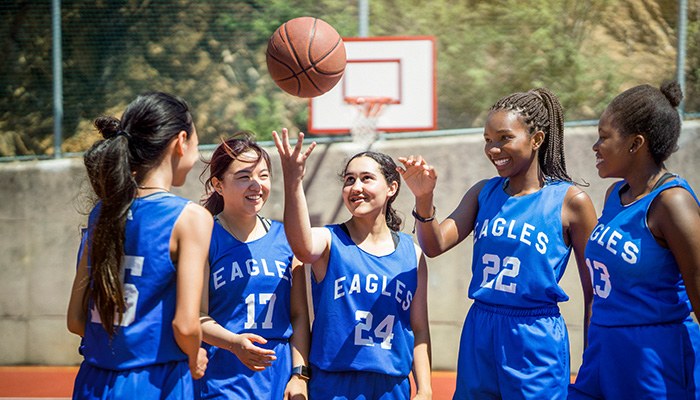HOW CAN WE HELP YOU? Call 1-800-TRY-CHOP
In This Section
Backed by CHOP Research, International Group Recommends Visio-Vestibular Exam for Concussion Diagnosis and Management

By ingenol [at] chop.edu (Lauren Ingeno) and shafere1 [at] chop.edu (Emily Shafer)
An international panel of more than 100 researchers and clinicians released new scientific evidence and revised recommendations on the diagnosis, management, and prevention of concussions. Included in those recommendations is the visio-vestibular exam (VVE) -- a clinical diagnostic tool developed after years of extensive research and clinical use at Children's Hospital of Philadelphia.
The newest international recommendations on concussion are based on outcomes from the Sixth International Conference on Concussion in Sport, held in Amsterdam in October 2022, and published in the British Journal of Sports Medicine in June 2023.
As part of the consensus statement released at the conference, the international group of experts recommended multiple assessment tools, including the new Child Sport Concussion Office Assessment Tool 6 (Child SCOAT-6). The VVE was incorporated as a key element of the Child SCOAT-6.
The VVE is a clinical assessment tool developed and refined by researchers and clinicians in CHOP's Minds Matter Concussion Program over the past decade. The exam identifies visual and vestibular system deficits, such as impaired eye movement, monocular and binocular visual function, and dynamic balance, as markers for both the diagnosis of and recovery from concussion. This type of testing is already used as a standard-of-care in settings across CHOP for the diagnosis and management of concussions, including in primary care, the Emergency Department (ED), urgent care, sports medicine, and trauma.
Now, the assessment tool will be adopted more widely in settings around the world, as part of the new guidelines.
"Our ultimate goal is for visio-vestibular testing to be routinely performed on every child who may have a concussion," said Daniel J. Corwin, MD, MSCE, the Emergency Department lead of the Minds Matter program, "regardless of where, when, and by whom their assessment occurs. The fact that the VVE has been recognized internationally as a critical evaluation tool for pediatric concussion is a significant step toward achieving that goal."
Dr. Corwin has served as a lead author on multiple studies evaluating the reliability, efficacy, and prognostic ability of the VVE, along with Christina Master, MD, co-director of the Minds Matter program.

Daniel Corwin, MD, MSCE
An Evolving Diagnosis
Though concussion is a common injury that medical providers encounter while caring for children and adolescents across many different settings, its diagnosis remains challenging. Part of the challenge comes from the fact that most diagnostic guidelines and tools rely on subjective symptom reporting, with limited objective tools to assess the injury, according to Dr. Corwin, who is also an attending physician and director of research operations in the Division of Emergency Medicine.
"The vast majority of children are diagnosed with concussion by their pediatrician or in an acute care setting, not by a concussion specialist," he said. "So, it's really important that the frontline provider is equipped with the tools to diagnose concussion efficiently and objectively."
Dr. Corwin often provides an analogy to parents to describe the visio-vestibular assessment: "Imagine examining a child who twisted their ankle and assessing their pain while sitting versus walking."
"Administering the VVE to a patient with a suspected concussion is equivalent to putting stress on the ankle by walking — we're pushing the brain to work a little harder than a standard neurologic exam in terms of the things that we might ask a child to do, which helps confirm the diagnosis of concussion," he said.
The VVE, he says, allows providers to augment their traditional symptom scale-based diagnosis with a more objective assessment of the function of a patient's vision and vestibular system. Moreover, understanding a young patient's visual, eye tracking, balance, and deficits early after the injury can allow the provider to better guide families on how to manage the issues a child may face as they begin to resume their daily activities, Dr. Corwin said.
"We've learned that if children are able to gradually resume light physical and cognitive activity that does not provoke excessive symptom exacerbation shortly after the injury, they recover more quickly," he added. "The VVE is a way for us to quickly get a sense of what a child will and won't be able to tolerate as they are returning to their school environment."
Generating Evidence to Become Standard of Care
The effectiveness of the VVE has been rigorously tested and validated by the Minds Matter team over the past 10 years.
The team has found strong diagnostic value for the exam: A 2020 study they authored, published in the Journal of Emergency Medicine, found that VVE testing increased the likelihood that a child would receive an immediate (versus delayed) diagnosis of concussion in the ED, leading to a quicker recovery. In a 2020 study published in the American Journal of Emergency Medicine, the team demonstrated that the VVE is reliable outside of the sports medicine setting, between different raters and among the same raters, and within several different ED provider types, including attending physicians, medical trainees, and advanced practice providers. Finally, Minds Matter researchers have shown that the exam can be used to predict which children will have prolonged recoveries from concussion, demonstrating that the presence of VVE deficits is associated with prolonged recoveries in a 2018 article in the Clinical Journal of Sports Medicine.
Those studies are part of a larger body of research that resulted in the inclusion of the VVE in recent international guidelines for the diagnosis and management of sport-related concussion in children.
Dr. Corwin said that over a decade of research, the Minds Matter team has evaluated thousands of CHOP patients with the VVE to develop and refine the clinical tool.
"Our patients are our learning laboratory," he said, "and it's our patients and research participants who have allowed us to generate this evidence, which now has the potential to help improve the diagnosis and management of children with concussion around the world."